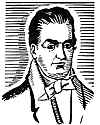 He was also much interested in steam. One day he came across a book
describing Newcomen's steam engine which had been developed in England.
Newcomen used atmospheric
pressure to do the work steam was
condensed to produce a vacuum under the piston. Evans however, thought
the steam should be used directly. Obsessed with this idea, he designed
and built a high pressure engine. Newcomen was interested only in
pumping water, but Evans visualized steam power being used to do all
sorts of work.
He was also much interested in steam. One day he came across a book
describing Newcomen's steam engine which had been developed in England.
Newcomen used atmospheric
pressure to do the work steam was
condensed to produce a vacuum under the piston. Evans however, thought
the steam should be used directly. Obsessed with this idea, he designed
and built a high pressure engine. Newcomen was interested only in
pumping water, but Evans visualized steam power being used to do all
sorts of work.By 1803 he seriously entered the steam engine business, and one of his first jobs was to build a steam dredge ordered by the city of Philadelphia. This was the amphibious vehicle which he demonstrated and described in 1804. Unfortunately Evans was ahead of his time as far as a market was concerned for he found the building and selling of steam engines full of disappointments and financial reverses. A fire destroyed his factory in 1819 and ended his active work, but his contributions along with thousands of others have made this country a great industrial nation. Evans lived in the days when America was still largely undeveloped. The frontier then was a definite, physical thing to be overcome by whatever tools were available. |








